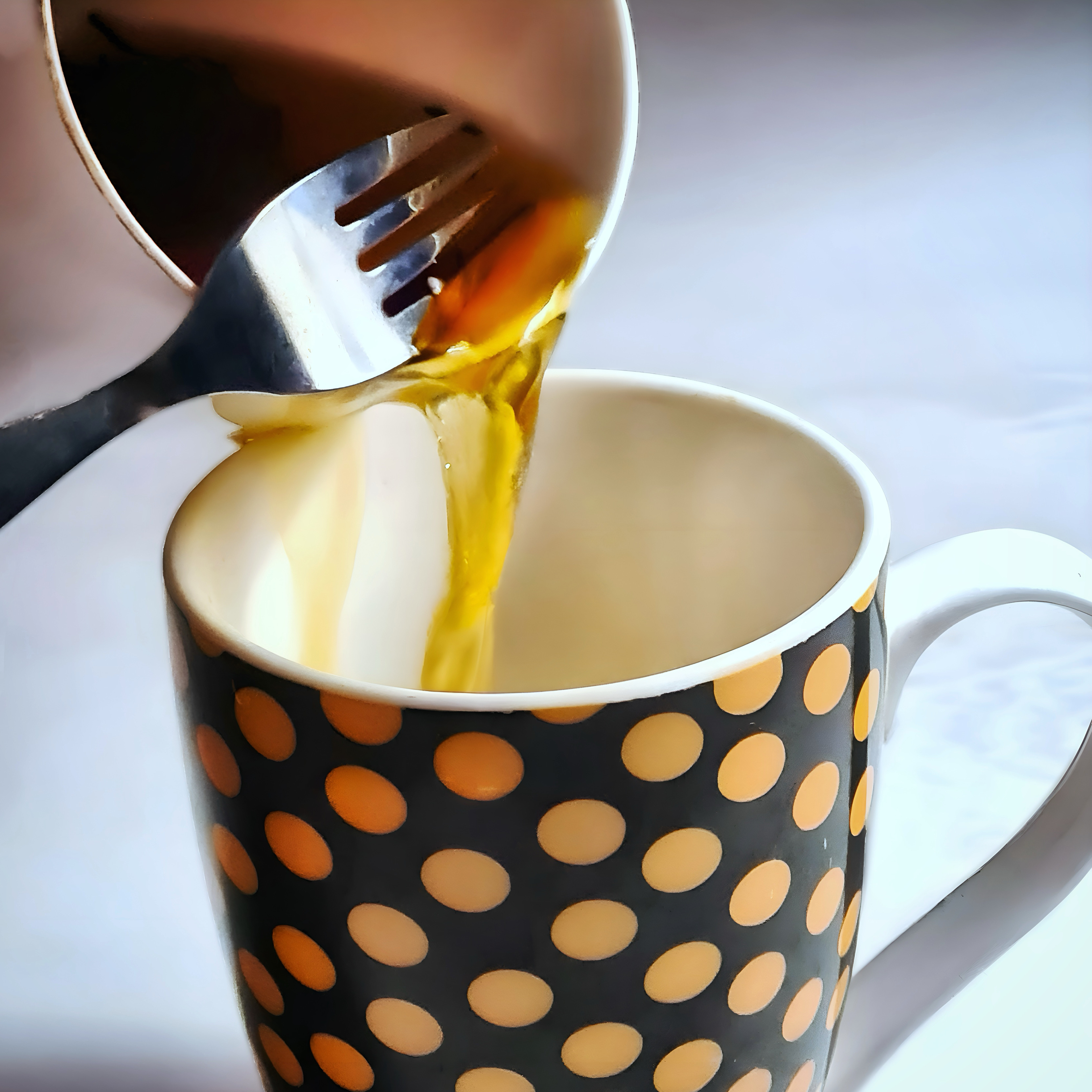Tea is one of the most popular beverages in the world, with countless varieties and ways of preparing it. Some people like it black, some with milk, some with sugar, some with honey, some with lemon, and some with spices. But have you ever tried adding salt to your tea?
You might think that salt in tea sounds like a terrible idea, but according to a US scientist, it could be the secret to making the perfect cuppa. Michelle Francl, a professor of chemistry at Bryn Mawr College, claims that adding a pinch of salt to your tea can enhance its flavor and reduce its bitterness. She also suggests squeezing the teabag energetically to extract more of the tea compounds.

This unconventional method of brewing tea has caused quite a stir in the UK, where tea is a cultural institution and a source of national pride. Some Brits are outraged by the idea of tampering with their beloved drink, while others are curious to give it a try. Francl’s advice has even sparked a diplomatic intervention from the US embassy, which assured the UK that adding salt to tea is not official US policy.
But what is the science behind salt in tea? How did Francl come up with this idea? What are the results of taste tests? Is there any historical or cultural precedent for this practice? What are the health implications of adding salt to your tea? And how can you try it yourself? In this article, we will explore these questions and more, and give you some tips on how to experiment with salt in tea.
The Chemistry Behind Salt and Tea
Tea is a complex mixture of hundreds of chemical compounds, including caffeine, polyphenols, amino acids, and volatile aromas. These compounds are responsible for the color, flavor, and health benefits of tea. However, not all of them are desirable, as some can also make tea taste bitter, sour, or astringent.
1. Water Quality
One of the main factors that affects the taste of tea is the water quality. The hardness, pH, and mineral content of the water can influence how the tea compounds dissolve and interact with each other. For example, hard water, which contains high levels of calcium and magnesium, can reduce the solubility of polyphenols and make tea taste dull and chalky. Soft water, which contains low levels of minerals, can enhance the solubility of polyphenols and make tea taste more bitter and acidic.
2. Brewing Time & Temperature
Another factor that affects the taste of tea is the brewing time and temperature. The longer and hotter the tea is brewed, the more compounds are extracted from the leaves. This can result in a stronger and more flavorful tea, but also a more bitter and astringent one. The optimal brewing time and temperature depend on the type and quality of the tea, as well as personal preference.
This is where salt comes in. Salt is composed of sodium and chloride ions, which can interact with the tea compounds and modify their taste perception. According to Francl, salt acts as a blocker to the receptor that makes tea taste bitter, especially when it has been stewed. By adding a pinch of table salt – an undetectable amount – you will counteract the bitterness of the drink. “It is not like adding sugar. I think people are afraid they will be able to taste the salt,” she said.
Salt can also enhance the flavor of tea by increasing the salivation and stimulating the taste buds. It can bring out the sweetness, sourness, and umami of your hot beverage, as well as its aroma. Salt can also balance the pH of the water and make it more suitable for brewing the leaves.

Michelle Francl’s Experiment
Michelle Francl is a professor of chemistry at Bryn Mawr College, a liberal arts college in Pennsylvania. She is also a tea lover and a tea researcher, who has written a book called Steeped: The Chemistry of Tea, published by the Royal Society of Chemistry. In her book, she explores the science and history of tea, and gives some tips on how to make the best brew.

Francl’s interest in adding salt to tea was sparked by her study of ancient Chinese manuscripts, dating back to the eighth century, which mentioned the use of salt in tea. She decided to try it herself and conduct some experiments in her kitchen. Using different types of tea, such as black, green, and oolong, and different amounts of salt, ranging from a pinch to a teaspoon. She also varied the brewing time and temperature, and the type of water and milk.
Her Results:
She found that adding a pinch of salt to black tea, especially when brewed for a long time, made it taste smoother and less bitter. Moreover, she found that adding salt to green tea, especially when brewed with soft water, made it taste more flavorful and less grassy. However, she did not notice much difference with oolong tea, which she said was already well-balanced.
She also experimented with squeezing the teabag energetically, which she said was a common practice in China. Ultimately, she found that this increased the extraction of the tea compounds, making the tea stronger and more aromatic. She said that this method worked well with salt, as it reduced the bitterness and enhanced the flavor.
Taste Test Results
Francl’s experiment has inspired some people to try adding salt to their drink and share their opinions online. Some of them have reported positive results, saying that salt makes it taste smoother, richer, and more complex. Others have expressed skepticism or disappointment, saying that salt makes it taste salty, weird, or worse. Some have suggested that the effect of salt in tea depends on the type and quality of the tea, the amount and type of salt, and the personal preference of the drinker.
US ambassador to UK Taste Test
One of the most prominent taste testers was the US ambassador to the UK, who posted a video on Twitter of trying salt in tea for the first time. He said that he was “very curious” about the idea and that he wanted to “show respect” to the British culture. Using a teabag of English breakfast tea, a pinch of table salt, and a splash of milk. He stirred the tea, took a sip, and gave a thumbs up. Afterwards, he said that it was “not bad” and that it had a “nice little kick to it”. He also said that he would “recommend it” to his friends.
However, not everyone was impressed by the ambassadors endorsement. Some Brits replied to his tweet with sarcastic or angry comments, accusing him of ruining their national drink and insulting their taste buds. Some even suggested that he should try adding other things to his tea, such as vinegar, bleach, or arsenic. Others defended the ambassador and praised him for being open-minded and adventurous. Some also said that they would try adding salt and see for themselves.
Historical Context of Tea with Salt
Adding salt to tea may seem like a new and novel idea, but it actually has a long and rich history. In fact, salt in tea is not uncommon in some parts of the world, especially in Asia, where tea originated and where it is still widely consumed.

China:
One of the earliest references can be found in the Cha Jing, or The Classic of Tea, written by the Chinese tea master Lu Yu in the eighth century. Lu Yu described the process of making tea, including the types of water, utensils, and additives to use. He mentioned that salt could be added to tea to enhance its flavor and health benefits. He also said that salt could be used to adjust the water quality and to prevent the tea from spoiling.
Tibet:
This unique technique is also a traditional practice in Tibet, where tea is a staple drink and a source of nutrition. Tibetans drink butter tea, or po cha, which is made by boiling tea leaves, adding salt, and mixing in yak butter. Butter tea is rich in calories and fat, which help Tibetans cope with the cold and high altitude. Butter tea is also a symbol of hospitality and friendship, and is offered to guests and visitors.
Mongolia:
Salt in tea is also popular in Mongolia, where tea is also a vital part of the culture and diet. Mongolians drink suutei tsai, or milk tea, which is made by boiling tea leaves, adding salt, and pouring in milk. Milk tea is often accompanied by bread, cheese, or meat, and is served throughout the day. Milk tea is also used for medicinal purposes, such as treating colds, stomach aches, or headaches.
Health Implications of Putting Salt in Tea

Positive Effects:
Adding salt to tea may have some effects on your health, both positive and negative. On one hand, salt may provide some benefits, such as:
- Improving hydration: Salt in tea may help retain water in the body and prevent dehydration, especially in hot or dry climates.
- Boosting electrolytes: Salt in tea may replenish the electrolytes that are lost through sweating, such as sodium, potassium, and chloride. Electrolytes are essential for maintaining the balance of fluids and the function of nerves and muscles in the body.
- Enhancing digestion: Salt in tea may stimulate the production of saliva and gastric juices, which aid in the digestion and absorption of food. Salt in tea may also help regulate the bowel movements and prevent constipation.
- Reducing stress: Salt in tea may have a calming effect on the nervous system, as salt can lower the levels of cortisol, the stress hormone, in the blood. Salt in tea may also promote the release of endorphins, the feel-good hormones, in the brain.
Negative Effects:
On the other hand, salt in tea may also have some drawbacks, such as:
- Increasing blood pressure: Salt in tea may raise the blood pressure, as salt can cause the body to retain more water and increase the volume of blood in the vessels. High blood pressure can increase the risk of heart disease, stroke, and kidney damage.
- Causing bloating: Salt in tea may cause bloating, as salt can draw water into the cells and tissues, making them swell. Bloating can cause discomfort, gas, and weight gain.
- Depleting minerals: Salt in tea may deplete the minerals that are naturally present in tea, such as calcium, magnesium, and iron. These minerals are important for the health of the bones, muscles, and blood. Salt in tea may also interfere with the absorption of these minerals from other sources, such as food or supplements.
Therefore, adding salt to tea may have different effects on different people, depending on their health condition, lifestyle, and dietary habits. It is advisable to consult with a doctor or a nutritionist before adding salt to your tea, especially if you have any medical issues or concerns. It is also recommended to use moderation and limit the amount of salt in your tea, as well as in your overall diet.
Tips for Trying Tea with Salt Yourself
If you are curious about adding salt to your tea and want to try it yourself, here are some tips to help you get started:

1. Choose the right tea:
The type and quality of the tea can affect how well it pairs with salt. Generally, stronger and darker teas, such as black, pu-erh, or oolong, can benefit more from salt, as it can balance their bitterness and enhance their richness. Lighter and greener teas, such as green, white, or herbal, may not need salt, as it can overpower their delicacy and freshness. However, this is not a hard and fast rule, and you can experiment with different teas and see what you like.
2. Choose the right salt:
The type and quality of the salt can also affect how it interacts with the tea. Generally, finer and purer salts, such as table salt or sea salt, can dissolve better and blend more evenly with the tea. Coarser and flavored salts, such as rock salt or Himalayan salt, may not dissolve well and may add unwanted impurities or aromas to the tea. However, this is also a matter of personal preference, and you can try different salts and see what you enjoy.
3. Use the right amount:
The amount of salt in your tea can make a big difference in how it tastes. Too little salt may not have any noticeable effect, while too much salt may ruin the tea. The ideal amount of salt in your tea depends on the size and strength of your cup, as well as your taste buds. A good rule of thumb is to start with a pinch of salt, about 1/8 of a teaspoon, and adjust according to your liking. You can also use a measuring spoon or a scale to be more precise.
4. Brew the tea properly:
The way you brew your tea can also affect how it reacts with salt. The optimal brewing time and temperature depend on the type and quality of the tea, as well as your preference. Generally, you want to brew your tea for the right amount of time and at the right temperature to extract the best flavor and aroma, without oversteeping or scalding it. You can follow the instructions on the tea package or use a timer and a thermometer to be more accurate.
5. Add the salt at the right time:
The timing of adding salt to your tea can also influence how it tastes. Generally, you want to add the salt after the tea has been brewed and before you add any other ingredients, such as milk, sugar, or lemon. This way, you can ensure that the salt dissolves well and mixes well with the tea, without interfering with the other flavors. You can also stir the tea well after adding the salt to make sure that it is evenly distributed.
6. Experiment with different combinations:
The beauty of adding salt to your tea is that you can create your own unique and personalized blend. You can experiment with different types of tea, salt, and other ingredients, and see what works for you. Not just this, you can also vary the amount of salt and the brewing method, and see how they affect the taste. You can also try adding salt to iced tea or cold brew tea, and see how they compare to hot tea. The possibilities are endless, and you can have fun and be creative with your tea.
Alternative Flavor Enhancers
Salt is not the only thing that you can add to your tea to change its flavor. There are many other unconventional additions that people have tried in their tea. See below:

• Baking soda:
Baking soda, or sodium bicarbonate, is a common ingredient in baking and cooking, but it can also be used in tea. It can neutralize the acidity and reduce the bitterness of tea, making it taste smoother and sweeter. Baking soda can also make the tea look brighter and clearer, as it can remove the cloudiness caused by hard water or tannins. However, baking soda can also alter the pH of the tea and make it more alkaline, which may not be suitable for some people or some teas.
• Cream of tartar:
Cream of tartar, or potassium bitartrate, is another common ingredient in baking and cooking, but it can also be used in tea. It can soften the water and increase the solubility of the tea compounds, making the tea taste more flavorful and aromatic. Cream of tartar can also prevent the formation of tea scum, which is the film that forms on the surface of tea when it cools down. However, cream of tartar can also lower the pH of the tea and make it more acidic, which may not be desirable for some people or some teas.
• Eggshells:
Eggshells, or calcium carbonate, are a natural by-product of eggs, but they can also be used in tea. They can act as a buffer and balance the pH of the tea, making it taste more neutral and pleasant. Eggshells can also provide some calcium and other minerals to the tea, which may have some health benefits. However, eggshells can also introduce some bacteria or contaminants to the tea, which may pose some health risks. Therefore, it is important to use clean and fresh eggshells and boil them with the tea to sterilize them.
• Vanilla extract:
Vanilla extract, or vanilla essence, is a popular flavoring agent in baking and cooking, but it can also be used in tea. It can add a sweet and fragrant note to the tea, making it taste more rich and indulgent. Vanilla extract can also complement and enhance the natural flavors of the tea, such as floral, fruity, or nutty. However, vanilla extract can also overpower the tea and mask its subtleties, especially if used in excess. Therefore, it is advisable to use a small amount of vanilla extract and choose a high-quality one that is pure and natural.
• Cheese:
Cheese, or fermented milk, is a delicious and nutritious food, but it can also be used in tea. It can add a creamy and savory element to the tea, making it taste more smooth and satisfying. Cheese can also create a contrast and a balance between the hot and cold, the sweet and salty, and the liquid and solid in the tea. However, cheese can also clash with the tea and create a weird or unpleasant combination, especially if the cheese is too strong or too sour. Therefore, it is recommended to use a mild and fresh cheese and pair it with a compatible tea.
Conclusion
Adding salt to tea is a controversial and intriguing idea that has sparked a lot of debate and curiosity among tea lovers and tea experts. Some people swear by it, while others shun it. Whereas, some people claim that it is a scientific and historical practice, while others argue that it is a sacrilegious and nonsensical one. Some people even say that it improves the taste and health of tea, while others say that it ruins it.
The truth is, there is no definitive answer to whether adding salt to tea is good or bad, as it depends on many factors. The only way to find out is to try it yourself and see how you like it!
If you are feeling adventurous and want to experiment with adding salt to your tea, we hope that this article has given you some useful information and tips on how to do it. We also hope that you have learned something new and interesting about the chemistry and history of tea, and the different ways that people enjoy it around the world.
We would love to hear from you and your experiences with adding salt to your tea. Did you like it or hate it? Notice any difference in the flavor or aroma of the tea? Did you feel any effect on your health or mood? Would you try any other unconventional additions to your tea? Please share your thoughts and comments with us and our readers, and let us know what you think!
Discover More Tea-Related Articles:
- Can You Drink Tea After Brushing Teeth? A Complete Oral Guide
- Tea for Constipation Relief: The Best Teas to Make You Poop
- Earl Grey Lemonade – A Simple and Zesty Iced Tea
- Korean Pomegranate Tea: The Simple Guide to ‘Seoklyu Cha’
- Lilac Tea: How to Harvest, Brew, and Serve This Fragrant Tea
Sources:
- US scientist recommends adding salt to make perfect cup of tea – BBC
- The chemist who told us to put salt in our tea explains why she did it | New Scientist
- Can You Add Salt In Tea? The Answer Will Surprise You
- The Health Benefits And Risks Of Adding Salt To Green Tea
- Nutritionist Does Not Encourage Adding Salt to Tea





Leave a Comment